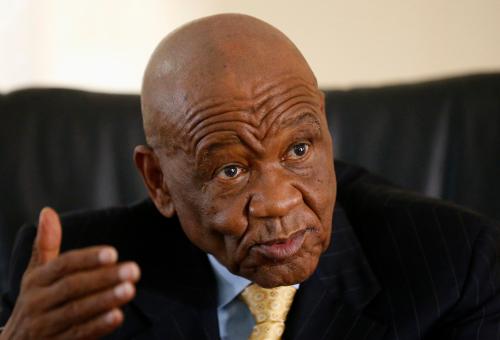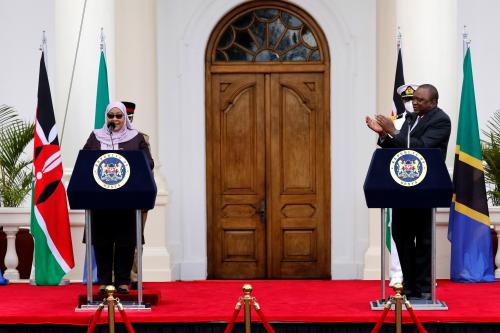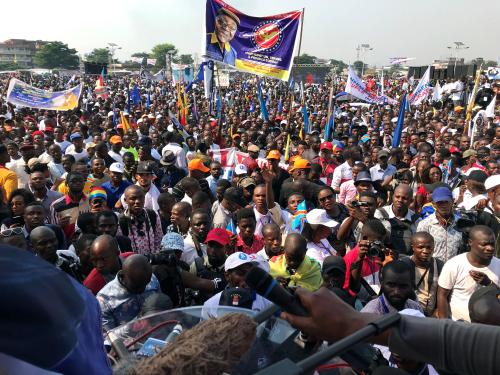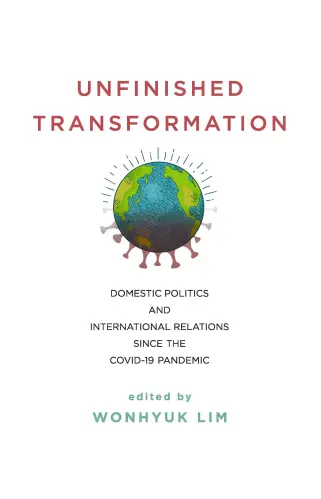Tanzania, Kenya, and UNECA enact environment-positive policies and programs
On Saturday, June 1, Tanzania’s ban on plastic bags went into effect. According to The Citizen, the new law targets the “import, export, manufacturing, sale, storage, supply, and use of plastic carrier bags regardless of their thickness” on the Tanzanian mainland. The law also bans the selling of items wrapped in plastic unless the “nature of such items” specifically require it. The consequences can be severe: The manufacturing or import of the bags have a maximum penalty of 1 billion Tanzanian shillings ($435,000) or up to two years in prison. Even possession of such bags carries a maximum fine of 200,000 Tanzanian shillings or up to seven days in prison. There is also an “on-the-spot” fine of $13, and visitors to the country must surrender any plastic bags in their possession at entry. Tanzania joins neighbors Rwanda and Kenya in the ban on plastic bags.
Similarly, on Thursday, June 5, Kenya’s new ban on single-use plastics in its national parks came into effect. According to The Star, “Kenyans going to the beach or national parks are banned from carrying water bottles, plastic plates, plastic cups as well as plastic spoons and forks.”
Meanwhile, on June 5, the United Nations Economic Commission for Africa (UNECA), in conjunction with European clean energy leaders, launched its climate change-focused energy initiative, Renew Africa, which aims to boost investments, especially from the European private sector, in renewable energy on the continent.
Zimbabwe and IMF agree on stabilization program
Last Friday, Zimbabwe’s central bank said it would cease printing money as part of a landmark deal with the International Monetary Fund (IMF), which has agreed to support Zimbabwe’s economic reform agenda through a staff-monitored program (SMP). As part of the agreement, IMF staff will support and offer authorities technical assistance to restore monetary stability. In particular, the SMP will assist Zimbabwe in the implementation of coherent economic and social policies that will guide the nation’s return to macroeconomic stability as well as help gain confidence from and reengage with the international community.
Zimbabwe continues to face deep macroeconomic imbalances from the substantial accumulation of fiscal deficits and external arrears, sustained inflation even in the post-Mugabe era due to over-borrowing from the central bank to pay bills, and currency instability after abandoning its own debilitated currency for a quasi-currency system.
Economic policies under the SMP emphasize the restoration of macroeconomic and financial sector stability by implementing a large fiscal adjustment, eliminating central bank financing of the fiscal deficit, and adopting reforms to allow the effective functioning of market-based foreign exchange and debt markets. Structural reforms include steps to reform and privatize state-owned enterprises, enhance governance in procurement and revenue administration, and improve the business environment.
Talks break down amid deadly attacks on Sudanese protesters
Early this week, dozens of peaceful protesters calling for an immediate transfer of power to a civilian-led authority in Khartoum, Sudan were killed during a Rapid Security Force (RSF) raid of their camp. The RSF, a state-sanctioned paramilitary force, has been patrolling the streets since Monday. Medics aligned with the protest movement have put the total number of casualties since patrols started at more than 100 people, with reports of over 40 bodies pulled from the Nile River by midweek.
The African Union (AU) interceded Thursday, suspending Sudan from participating in organizational bodies until a civilian-led transitional authority is established. Sudan’s suspension is the first since the AU suspended Egypt in 2013 following the military overthrow of Mohamed Morsi. The United States, the United Kingdom, and Norway also issued a joint statement condemning the crackdown on protesters and blaming the Transitional Military Council for ordering the attacks. Saudi Arabia, the United Arab Emirates, and Egypt continued to back the military council led by chair General Abdel Fattah al-Burhan Abdulrahma and deputy chair Mohamed Hamdan Daqlu, leader of the RSF, and support the resumption of talks. Opposition leaders, though, refuse to participate in further negotiations with the transitional government after the RSF’s role in Monday’s attack. Meanwhile, Ethiopian Prime Minister Abiy Ahmed, alongside officials from the regional body IGAD (Intergovernmental Authority on Development), traveled to Khartoum Friday following the AU suspension to mediate between the government and opposition. Opposition leaders, initially resistant to further negotiations with the government, accepted Abiy’s mediation, contingent on the Transitional Military Council meeting a number of conditions. Among the alliance’s list of demands are stipulations that the Transitional Military Council recognize the deadly attack on protesters, allow an international commission to investigate the RSF’s crimes, reopen internet access, release political prisoners, and respect Sudanese citizens’ civil liberties.
Genevieve Jesse contributed to this post.
The Brookings Institution is committed to quality, independence, and impact.
We are supported by a diverse array of funders. In line with our values and policies, each Brookings publication represents the sole views of its author(s).











Commentary
Africa in the news: New environmental policies on the continent, Zimbabwe’s IMF stabilization program, and Sudan update
June 8, 2019